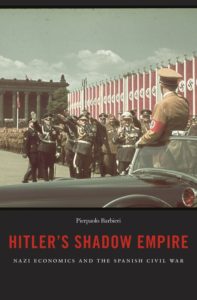 Reviewer: Wouter van Dijk
Reviewer: Wouter van Dijk
Hitler’s Shadow Empire. Nazi Economics and the Spanish Civil War, Pierpaolo Barbieri
Harvard University Press, Cambridge MA / London 2015
ISBN: 978-0-674-72885-1
Hardcover with dust jacket, with map of Spain, pictures in black and white, appendices with economic data, notes and index
349 pages
$29,95 / €27,70
Nazi economics in Nationalist Spain, or how Franco sold Spain’s wealth to Hitler
That without the massive help of Nazi Germany and Fascist Italy the rebel general Franco and his troops would never have won the Spanish Civil War is something supposed to be known by now. However, what receives less attention from historians is the price Franco had to pay for this support because fascist solidarity was not free of charge. Especially the Germans were keen to exploit Franco’s vulnerability in order to extract much-needed raw materials from Spanish soil, where Mussolini was more concerned with Italy’s appearance as a powerful nation and its image on the international stage.
Economic historian Pierpalo Barbieri reveals how in Hitler’s Germany under the supervision of financial-economic mastermind Hjalmar Schacht an economic system was set up in which Spain’s mineral wealth was used in Germany’s ever-expanding war industry. According to Barbieri, it was Schacht and Schacht alone who reorganised the German interwar economy in order to dominate unfortunate less-developed countries economically. In a very extensive and detailed way, Barbieri follows Schacht through his career, from his first dealings in the financial sector of Germany’s hyperinflationary nineteen-twenties all the way to his position as economic dictator of the Third Reich. Due to his able management of the Reichsbank and financial policy during the harsh post-Versailles Schacht was seen by countrymen as well as by foreigners, to be the best man to handle Germany’s precarious economic and financial position. Over the years, Schacht became more and more radical in his ideas of German economic development until he advocated some sort of informal empire, more or less in line with earlier conservative ideas of Wilhelmine traditional empire, with colonies for providing the necessary raw materials for Germany’s industry. Compared to the radical and racial Lebensraum policy that was also advocated in Nazi Germany however, Schachts economic ideas were moderate.
In the early 1930’s Schacht set out to materialize his neo-Weltpolitik vision of informal empire for Germany. This way, Germany would be able to exploit less developed ‘colonies’ economically while avoiding Allied obstruction to obtaining real formal colonies. After Hitler’s rise to power in 1933, an ambitious rearmament program was set up, with spendings on the military increasing year by year. Arms however, are not adding value to the economy by themselves, so in order to avoid a crashing standstill of the German weapon industry and with that the whole German economy, Schacht sought and found an exhaust valve in the outbreak of hostilities in Spain in 1936. Franco needed German weapons and Germany needed Spain’s raw materials and since Franco was in no position to bargain, the Nazi’s were able to force upon him and his fellow rebels an economic structure that provided for the extraction of Spanish valuable resources.
This system of formalized extraction of Spanish raw materials in exchange for military help remained in place even after Schacht was ousted by his political rival Hermann Göring in 1937 and policy was directed to more radical Lebensraum ideas and towards formal, much more inefficient, empire. Only after Hitler had entangled himself in war with almost whole Western Europe and the Soviet Union it was possible for Franco to reduce the export of Spanish resources to Nazi Germany.
Although Barbieri surely seems to know what he’s writing about, the book could have been better or at least, more consistent. While reading through the first hundred-or-so pages I kept wondering when precisely the analysis would take me to Spain and the economic network on the ground that was implemented to extract its mineral wealth. In short, it wouldn’t. Eventually, halfway the book we leave Schachts German domestic policies for a while and learn how the exploitation of Franco’s Spain took form. This remains all very abstract though and no data or amounts of resources that were obtained are given while that is just what’s so interesting; what did Franco exactly have to pay, how much of it and were did it came from? How were these shipments of raw materials organized, logistically and bureaucratically? Unfortunately, Barbieri focuses almost solely on the German side of the deal and after the brief section about HISMA-ROWAK, the company that took care of the resource extraction we get a chapter about Mussolini and his motives for participating in the Spanish struggle for reasons that remain in the dark. Of course Mussolini played his part in the Spanish conflict, but devoting a whole chapter to the man and his ‘policies’ in order to tell that the Italians were fooled by the Francoists and only left the Spanish conflict weaker than when they entered it seems a bit too much.
In general, it seems that Barbieri tried to put a bit too much in this book, and while being busy, overlooked some of the key elements in his story. Now the book is a mixture between a professional biography of Schacht, an investigation into German interwar economics, and a Spanish Civil War history. That an sich is no problem, and is indeed indispensible in a book treating this subject, but the right proportions are lacking. Of course it is necessary to explain where a man like Schacht came from and how he developed his ideas about informal economic empire but half a book is a bit excessive. Some more attention for Franco and the Spanish side of the agreement with Hitler would have brought more balance in the book and would have done more justice to the book’s title. Nevertheless, it remains a very interesting subject and a very interesting book for those eager to learn more about the lesser-known aspects of Spain’s civil war. Barbieri has done a nice job in shedding light on that shadowy Nazi empire in Spain.
Wouter van Dijk
